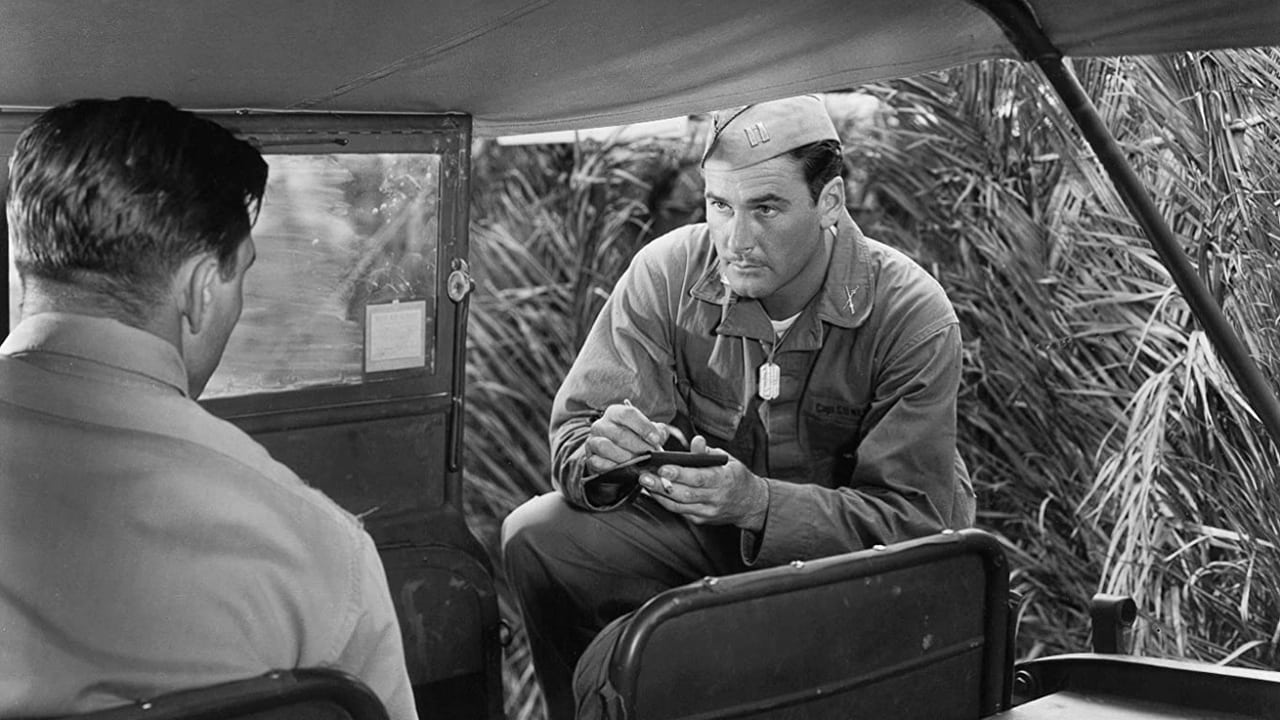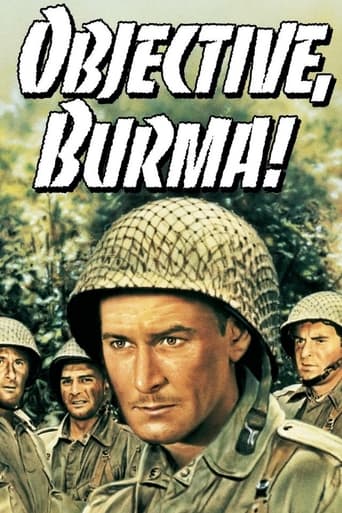Interesteg
What makes it different from others?
Teddie Blake
The movie turns out to be a little better than the average. Starting from a romantic formula often seen in the cinema, it ends in the most predictable (and somewhat bland) way.
Myron Clemons
A film of deceptively outspoken contemporary relevance, this is cinema at its most alert, alarming and alive.
Zlatica
One of the worst ways to make a cult movie is to set out to make a cult movie.
johnsobr3700
Objective Burma – Is one of my favorite movies. The inspiring leadership found by Captain Nelson (Errol Flynn) is great. I love the part where Gabby (the comic relief guy) looses his water purification tablets. Captain Nelson orders Gabby to use his. Later on, Gabby says " he would follow him into the mouth of a cannon". Captain Nelson also follows orders even when they do not make sense. Going deeper into enemy territory without knowing why. When they reach their deserted destination he says "What did you expect to find up here, anyway? I don't like this any better than you do. But we had orders to come here, and we'll stay here if we rot waiting.". Some of the footage is actual WWII footage (a little grainy).Some Phrases and terms used at times politically incorrect (by today's standards) , but it reminds me of the attitude back in those days. We had an enemy.I was never in the Military, and I appreciate the tactical military scenes. Some scenes that would probably be skipped in todays movies (like watching the soldiers bury their parachutes and supply boxes or lining up in order of the jump and double checking their parachute chords). This movie does not focus on the toughness of a particular person (no Rambo type here). Soldiers with specific duties and responsibilities working together on a mission. Great leadership, but no Super Heroes.The Parachute scenes with major air drops are spectacular.
johnkistner
As a drama the film does a good job, in terms of historical accuracy one questions it. The fighting in Burma was not carried out by the USA, but by the army of the United Kingdom. Had this operation actually occurred, it would have been carried out by the SAS. English soldiers fought in Burma from day one until the very end of the war. Fighting in the harsh, humid jungles of Burma was no easy task for the English army who were not accustomed to the extreme climate, the Japanese soldiers had the advantage. By suggesting that the USA came in and saved the day, I.e., the Calvary rushing in at the last minute, we minimise the role of her Majesty's forces and those who fell in her service. Many Englishmen paid the ultimate sacrifice for their queen and country. Burma was a British sphere of operation, just as the Philippines were an American theatre of operations. Let's not minimise the role of others.
TheExpatriate700
Objective, Burma! is one of the best war movies to come out of the WWII era. It is reasonably realistic given the constraints of the time period, and keeps the patriotic fanfare to a minimum. The film follows the travails of soldiers on a special mission to destroy a Japanese radar station after they get stuck behind enemy lines.What makes this film better than average is its second half, which concentrates on the soldiers' struggle for survival in the Burmese forest. The film plays up the lack of supplies, with the attendant threat of starvation, and the casualties. Although the film does some of the typical telegraphing of who will die, the deaths are still affecting.Objective, Burma eschews the patriotic fanfare characterizing many other World War II movies, wisely focusing on the challenges faced by the soldiers. Although there is some racism directed at the Japanese, such as referring to them as monkeys, this is minimal compared to other contemporary films.
sddavis63
Errol Flynn (who I am most familiar with as a swashbuckling swordsman type) offered a totally convincing performance here as the commander of a group of American commandos sent behind enemy lines into Burma to blow up a Japanese radar station in preparation for an allied invasion of the country during World War II. At about the one hour mark of the movie you begin to wonder what's happening. Everything seems to be far too easy for the Americans. They get into Burma with no trouble; they blow up the radar station quickly and easily (and kill a bunch of Japanese soldiers in the process) and they quickly get away to the rendezvous point where they're to be picked up by an American plane - and they do all this without suffering a single casualty. And yet, it's the very easiness of the mission that begins to build the tension. You know it can't be this easy; you know something has to happen - which it finally does. The plane that's supposed to pick them up can't land because there are too many Japanese around, and the men are forced to try to find their way out of Burma and back to their base on foot - an increasingly hopeless task as they deal with hunger, the jungle, and the Japanese.The climax of the movie probably begins when Nelson (Flynn) orders the squad to split into two and meet up later. The second group gets captured, and when Nelson finally finds them, he discovers that they've been horribly massacred in a Japanese-held village. Nothing of the massacre is shown (which makes it all the more horrific to the viewer, because it's all left to your imagination) but we get a taste when they discover Lt. Jacobs (William Prince) still barely alive. He begs Nelson to kill him just before he dies, making you wonder what's happened to him. That was a very brief but very powerful scene.I would describe this movie as tense rather than exciting in the standard way, and the tension is built very well. I'm not tremendously fond of war movies, but I liked this because the emphasis wasn't so much on never-ending battle, but was rather on the human story of these soldiers and how they dealt with their seemingly hopeless situation, and with the prospect of dying in the jungle and never seeing home again.

